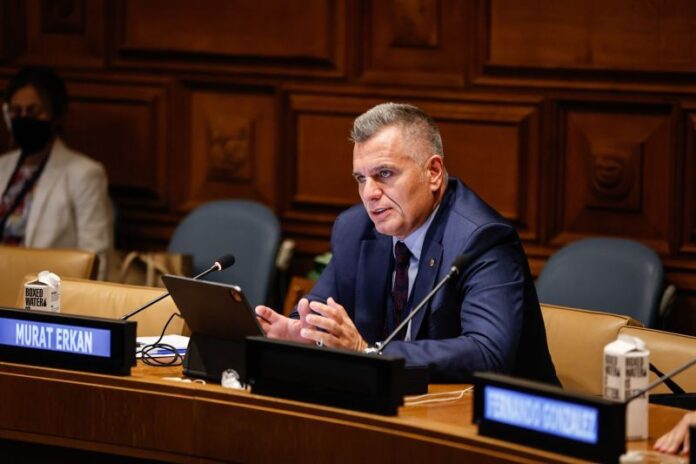Telco’s mobile subscriber base reaches 37.6m as mix changes more towards postpaid
Turkcell has announced plans to invest $240 million in renewable energy and is aiming to meet 65% of its electricity consumption from renewables in 2026 and 100% in 2030.
Speaking at the company’s Q2 results, CEO Murat Erkan said the telco will have 300MW of solar energy coming online in the next three years.
Turkcell Group currently sources 8%, or 74.4GWh, from renewable resources, he told a press conference, reported on by Hürriyet Daily News.
Under its so-called “Greensite” project, the company installs solar panels to power its cell towers. “To date, we have saved around 680,000kWh of electricity at those cell towers,” Erkan told Hürriyet.
Turkcell operates an 18MW wind power plant with six turbines in İzmir which produces enough electricity to power around 2,500 base stations, said the chief executive adding that Turkcell has saved around 131GWh of power and 406m Turkish Liras thanks to its energy efficiency projects.
Strong set of results as price rises bite
Turkcell reported a 73.5% YoY increase in group revenues in Q2 to TRY21.65bn, primarily caused by accelerated ARPU – a cumulative impact of sequential price increases and a focus on upsell to higher packages – and positive contributions of digital business services and its financial services (techfin).
EBITDA increased by 89.3% to TRY9.5bn, yielding an EBITDA margin of 44%, driven by solid topline performance and energy price discounts. Despite currency volatility in the quarter, the telco said its “prudent risk management” contributed to a 70.1% YoY rise in net income to TRY3.2bn.
Turkcell’s mobile subscriber base reached 37.6m in Q2, supported by seasonality effect which is lower than normal trend. The telco saw 404k postpaid net adds, which reached 67.0% of total mobile subscribers. Its prepaid subscriber base decreased by 239k. Tourist mobile data solutions and rising new acquisitions price levels mitigated that fall.
Erkan said the telco reacted quickly to “aggressive campaigns by competitors” with competitive offers and as a result, mobile ARPU (excluding M2M) exceeded the highest average inflation of last year and rose by 84.5% YoY on the back of price rises, a larger postpaid subscriber base and its upsell performance. The average monthly mobile churn rate slightly increased to 1.9%.
Average monthly mobile data usage per user increased by 17% year-on-year to 16.5GB in Q2 23. The average mobile data usage of 4.5G users was 17.6GB. Total smartphone penetration on its network reached 89% in Q223 on a 2.2pp YoY increase. 94% of those smartphones are 4.5G compatible smartphones.
Fixed subs continue to grow
On the fixed front, the telco’s fibre subscriber base continued to grow, with 40k net adds. Total fixed subscribers reached 3m on 33k net adds. Meanwhile, IPTV subscribers exceeded 1.3m on 35k net adds. Residential fibre ARPU growth was 48.6% YoY, driven mainly by price adjustments and increased IPTV penetration at 67% as well as upsell efforts to higher tariffs. The average monthly fixed churn rate stood at 1.4%.
“We followed the incumbent operator’s price increases in July and made price adjustments for our fixed customers in August,” said Erkan. “The more than half of our fibre subscribers have opted for the 12-month contracts or contract-free tariffs as of the end of this quarter, thanks to our strategic focus on those offerings, where we can reflect price adjustments to our subscribers in a timelier manner during the inflationary period.”
He added: “We achieved 165k additional home passes during [the quarter]. We are delighted to exceed our annual target of 300k in the first half, benefiting from more favourable FX rates. In line with our fibre expansion, the take-up ratio decreased just below 40%.”
Clouds with silver linings
The telco’s digital business services, which constitute 10% of Turkcell’s revenue, registered 82% YoY growth. “The main growth drivers were system integration projects, [with the] data centre and cloud businesses, each doubling their revenues annually. Notably, the backlog from system integration projects has reached TRY2.9m,” he said.



